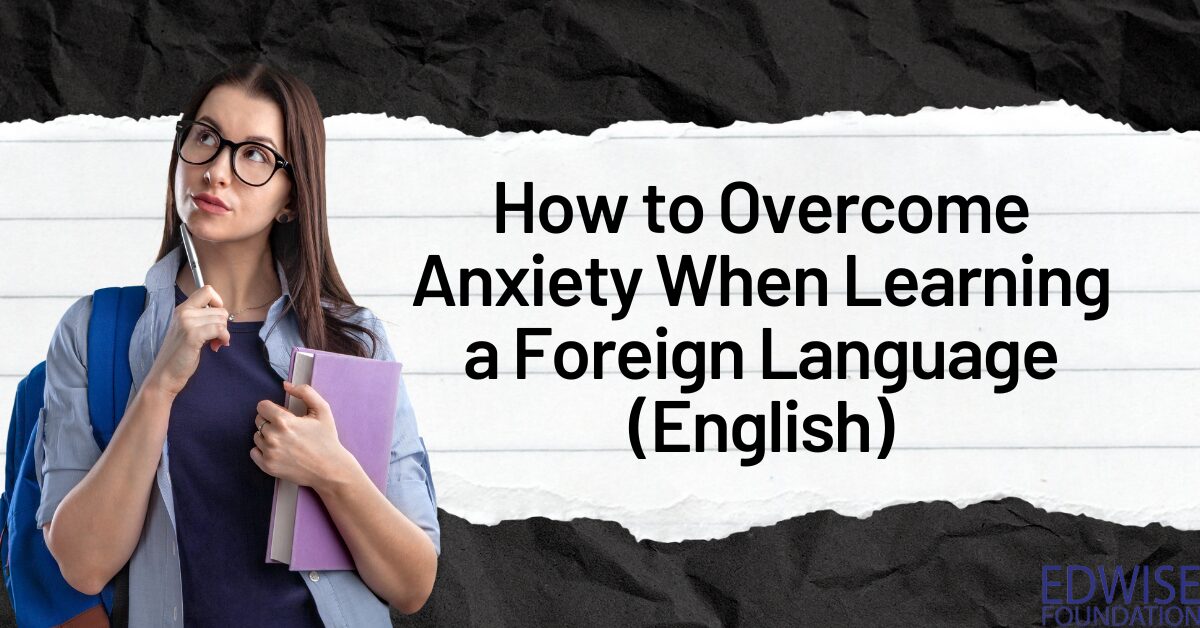How to Overcome Anxiety When Learning a Foreign Language (English)

Struggling with learning a new language? Do not let anxiety trip you up! Instead of staying awake all night panicking about your exams, use these simple tips to find your rhythm.
- Identify your fear and accept it
It is completely normal to feel anxious when it comes to using the English language! To better manage your anxiety, try to identify what specifically triggers it. Is it the worry of not being understood or the fear of making grammatical mistakes?
Once you know the cause of your anxiety, the next step is to address it directly. Consider reaching out to English tutors, either in an academy or through private lessons. It is a great way to provide support and help you build your confidence. Remember, everyone learns at their own pace, and it is okay to ask for help!
- Mistakes are Natural, Speak Confidently
It is normal for a language learner to feel scared of making mistakes and to feel ashamed when they do. However, making mistakes is an inevitable and normal key part of the English language learning process. Instead of worrying about every small mistake, it is helpful to change your attitude to be able to speak English freely.
Speaking confidently can help you pinpoint areas that need improvement, allowing you to tailor your learning effectively. The more you practice speaking in English, the more comfortable you will become. Over time, this will help you reach a natural level of fluency.
- Do the Active Listening
We learn a new Language mainly by listening, but many English language learners overlook this point. When you listen to other English speakers, focus on actively listening instead of worrying about what to say next.
Additionally, listening to different speakers talk about similar topics can deepen your understanding of English. This exposure helps you quickly build a natural vocabulary and improve your listening skills. So, accept listening as a key part of your learning!
- Get a Deep Learning of the English Language
Traditional English teaching often encourages you to learn a lot of words and phrases quickly. However, this can make it hard to remember them. A better way to learn is to focus deeply on one word, phrase, or topic at a time. This way, you understand it, just like a native speaker.
When you take your time with vocabulary, it sticks in your memory better. You will find it easier to use the right words confidently. Over time, you might even start thinking in English instead of translating from your native language. This deep learning makes speaking and understanding English much easier!
- Sign Up for a Fluency Course
You can become fluent more quickly by taking a fluency course, which is like taking a speed bump to fluency! There are a lot of easily accessible fluency offline and online courses available out there.
In these, real-world speech, visual aids, and narratives about topics you find interesting will all help you become a far better public speaker. This removes the need to commit word lists, translations, and grammar rules to memory.
- Learn Conversation Starters
Speaking with others is the finest method to improve your English language and overcome your anxiety. It can be difficult to come up with a conversation-starting topic, though. A fantastic technique to start a conversation about a subject you are familiar with is to prepare some conversation starters.
Short dialogues should be memorized, and each part should be as realistic as possible. Consider the words you will use to address them and the reactions you might get. To get ready, read up on topics that interest you and watch videos or audio recordings. This will help you build the vocabulary you need to discuss the topics you are passionate about.
- Practice, Practice, Practice
When learning a foreign language, especially one you will not use frequently, anxiety is unavoidable. In actuality, practice is the key to getting the best outcomes when learning the English language, regardless of the strategies and techniques you use.
Your continuous practice makes you proficient at it, and you have to do this if you wish to speak fluently. You will naturally construct more sentences in your thoughts and feel less anxious the more you speak. The most crucial factor in learning a foreign language is practice, so even if you know you made a mistake, just keep going.
- Learn Your Way
Find your own pace, converse with locals, and step out of your usual friend group. You will notice that slowly you can become more spontaneous when speaking English and gain lifelong friends in the process.
All the best on your English learning journey! I hope these personal experiences are useful for you to overcome your fear and reach your goal of becoming a fluent English speaker.


